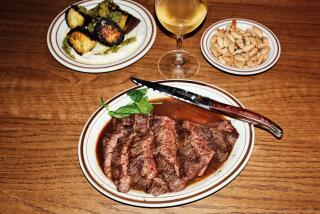Hollywood Hot Dog Aces Screen Test
- Share via
CHATSWORTH — Ever since the Winnetka 20 movie theater opened last year, Lila Carone has come here almost weekly, usually in the afternoons.
But it’s not the bargain matinees that draw her. It’s the food--specifically, the Pink’s chili cheese hot dogs. A Los Angeles culinary institution, Pink’s hot dogs were available only at the original Pink’s stand on La Brea Avenue near Melrose Avenue until the Winnetka 20 started selling them last year.
“I come with a friend just to buy the hot dogs for lunch. We don’t even stay for a movie,” said Carone, who lives in Chatsworth. “I’m the biggest Pink’s fan there is.”
But she’s far from the only one. During the theater complex’s first year in business, it sold 175,000 hot dogs--about a third the number sold annually at the La Brea stand, and at a higher price.
Based on that enthusiastic response, the Pacific Theatre chain and Pink’s owners are slowly bringing the legendary dogs to movie patrons at other locations.
Pacific now sells Pink’s dogs at its Northridge Fashion Center multiplex, which opened last November, and is considering adding them to the snack bar menu at its Beach Cities complex in Manhattan Beach.
The chain is also looking to bring the dogs to one of its multiplex cinemas in Hawaii.
The idea of visiting a theater for a hot dog may sound as foreign as going to a baseball stadium for a fine beer, but Pink’s has inspired considerable devotion in its 60-year history.
With a reputation as the hot dog haunt of the stars, Hollywood folklore has Pink’s as the place where Bruce Willis proposed to Demi Moore. Director David Lynch has included Pink’s in an upcoming TV series based in Los Angeles. Rosie O’Donnell, while in town filming her talk show, had 1,300 Pink’s chili dogs delivered to her studio audience.
It was that cachet that the Pacific Theater chain hoped to tap into when it signed an exclusive distribution agreement with the family-owned Pink’s. But adding the dogs to the menu lineup isn’t all that simple.
Each theater complex must be big enough to accommodate the special steamers and staff to prepare the hot dogs according to Pink’s exacting standards. Another consideration is whether the venue has close enough ties to Los Angeles to play off the devotion and nostalgia the Pink’s name inspires.
“The closer you are to Hollywood, the more people will have heard of Pink’s and be motivated by that,” said John King Jr., general manager of the Winnetka 20. “No one in Bakersfield knows what a Pink’s hot dog is.”
Meanwhile, the Pink family is also looking into selling its hot dogs at a few other locations. Richard Pink, the son of Pink’s founder Paul Pink, said likely candidates include an airport terminal or college campus.
Pink said he and his wife, Gloria, who runs the family business, are currently talking to “a major university in the area,” although he declined to specify which one.
According to Jody Darrow, Pacific Theatre’s director of concessions, hot dogs account for about 20% of all snack bar sales at Pacific theaters where conventional hot dogs are sold. But the percentages are higher at the Winnetka 20 and Northridge Fashion Center theaters that sell Pink’s.
And in keeping with a tradition familiar to moviegoers who suffer sticker shock when buying popcorn and soda, the Pink’s dogs carry a hefty markup. A 10-inch stretch chili dog that sells for $2.60 at the Pink’s on La Brea costs $3.50, or 35% more, at the Winnetka 20.
Darrow said, however, that despite their popularity, the Pink’s dogs are not nearly as profitable as, say, popcorn and candy, because preparing the dogs is more labor-intensive.
Unlike typical theater hot dogs that start out frozen and are cooked on a rolling griller where they can remain for hours, Pink’s delivers a fresh supply of hot dogs daily. They must be prepared in steamers for a set amount of time.
If the hot dogs stay in the steamers too long, Pink’s dictates they must be thrown out. The same goes for the famous chili: If it gets overheated and starts looking “cakey,” it has to go in the trash, Richard Pink said.
So instead of looking at hot dogs as a major source of profits, Darrow said, the theater regards Pink’s as a marketing tool to pull in movie audiences.
“A couple coming to the Winnetka specifically to buy a hot dog? I would love that at all the concessions at all the theaters, but it just doesn’t happen,” Darrow said.
Even so, the Winnetka 20 allows people into the snack bar area to buy Pink’s hot dogs--without having to buy a ticket.
The dogs themselves are all-beef and made in the 10-inch size exclusively for Pink’s by Hoffy.
The commitment to re-creating the taste experience of the original Pink’s has been noticed by loyal Pink’s customers such as Carone and her husband, Nick, who say the main reason they see movies at the Winnetka 20 is because of the hot dogs.
Recently, the Carones brought their friends, Larry and Ronna Yarow of Encino, to the theater in Chatsworth so they could sample the Pink’s dogs. Larry Yarow explained that as someone who had grown up on Pink’s hot dogs while a student at Fairfax High School in the 1950s, he would be a tough judge.
“If it wasn’t Pink’s, I would never have a hot dog at the movies,” he said.
After biting into a chili dog with the works, Ronna Yarow said she was a wee bit disappointed with the texture of the bun. But her husband declared the theater version “close enough” to the hot dog of his teenage memories that he would happily come back for another.
“Of course, there is still something special about going to the original Pink’s,” he added.
Richard Pink said that when he and his wife first considered making their hot dogs available outside the Hollywood stand a few years ago, he was well aware of the nostalgia-induced goodwill his family’s business had built over the years and worried about squandering it.
They feared that another free-standing Pink’s located in just another mini-mall would never be able to compete with the original stand, and that it would prove too difficult to monitor quality if they went the franchise route. So they decided to look into movie theaters, where it would be possible to maintain a sense of “exclusivity.”
After talking to several theater chains, they settled on Pacific, which promised to invest in the equipment and training Pink felt was necessary to maintain his product’s reputation.
“Gloria and I said we would only go with someone who would love Pinks. We could not sell it. You either got it or you didn’t,” he said.
More to Read
Sign up for The Wild
We’ll help you find the best places to hike, bike and run, as well as the perfect silent spots for meditation and yoga.
You may occasionally receive promotional content from the Los Angeles Times.






